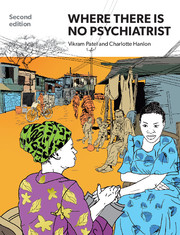Part 3 - Clinical problems
Published online by Cambridge University Press: 24 March 2018
Summary
Parts 1 and 2 of this manual discussed the general issues that apply to all mental health problems and treatments. Part 3 will take you through the common types of clinical problems associated with mental health problems. A problem-solving strategy is used. This means that mental distress, disorders and disabilities are discussed according to how you would approach a person presenting with a particular kind of problem. Diagnoses are not used as the starting point, since this would assume that you will already know what the problem is. Instead, we begin with clinical problems that you are likely to encounter and then work our way to finding out how you can help the person with the problem. It is important that you are familiar with Part 1 before you use the problem-solving strategy used in Part 3.
The clinical problems associated with mental health are grouped into six major groups. Chapter 6 covers emergency presentation where an immediate response is required. The approach to assessing the emergency and providing intervention is laid out in flow charts which you can refer to quickly. You can copy the charts and put them up on the wall so that anyone can find them easily if they need them.
Chapter 7 covers the non-emergency response to the most disturbing and worrying clinical problems that you will encounter. The most common causes of such severe behaviour changes are the psychoses.
Chapter 8 deals with physical symptoms such as tiredness, aches and pains, and dizziness. These are among the most common of all health problems in general health care, but often no ‘medical’ or physical explanation can be found for them. The most common causes for such symptoms are depression and anxiety disorders. Common problems affecting any community are alcohol and drug dependence. These are discussed in Chapter 9, along with dependence on prescription medications, tobacco, gambling and the emerging problem of internet addiction.
Chapter 10 examines problems arising from loss and violence. Violence can do a great deal of harm to mental health. Losing someone through death (bereavement) is also a trauma, especially when the loss is sudden and unexpected. The most common mental health problems associated with these experiences are depression, anxiety and post-traumatic stress disorder (PTSD).
- Type
- Chapter
- Information
- Where There Is No PsychiatristA Mental Health Care Manual, pp. 108 - 110Publisher: Royal College of PsychiatristsPrint publication year: 2018
- Creative Commons
- This content is Open Access and distributed under the terms of the Creative Commons Attribution licence CC-BY-NC-ND 4.0 https://creativecommons.org/cclicenses/



